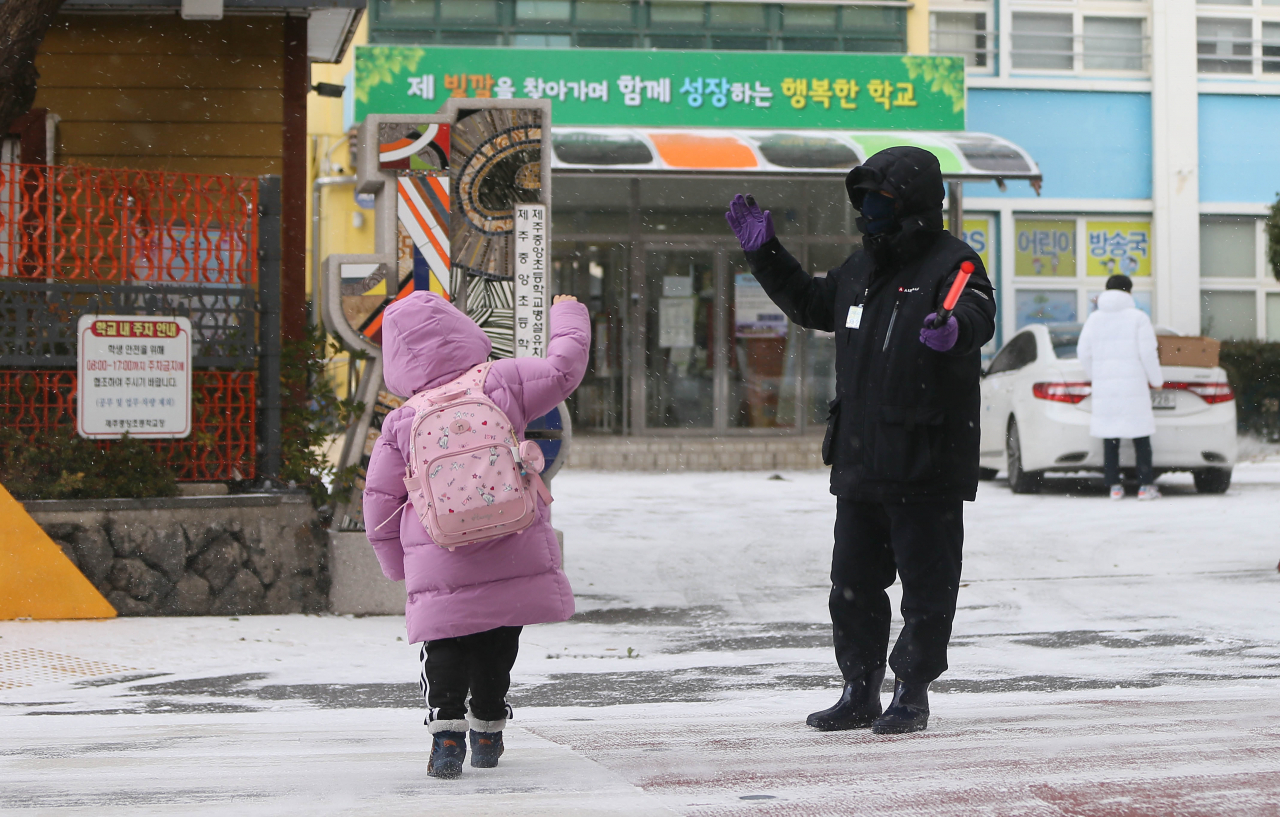[Newsmaker] Govt. to expand in-person classes for younger students this year
By YonhapPublished : Jan. 26, 2021 - 11:39

Younger students and disabled children will get more in-person instruction this year, the Ministry of Education said Tuesday, to fill their academic and social needs exacerbated by the coronavirus pandemic.
Announcing its work plan and goal for this year, the ministry said it will continue to ensure a safe learning environment at school despite the threat of the virus, and aim to bring more children back to school.
"The ministry will prioritize to have preschoolers, lower graders of elementary school and disabled students physically go to school, considering their social needs and developmental stages," it said in a press release.
Toward that goal, it will provide schools with more staff to help kids maintain social distancing and enforce various health safety measures.
It also plans to use some 2,000 temporary teachers for young elementary school kids to help them fill the learning gap left by long-term online classes. Outside school, the ministry is also scheduled to gradually open thousands of state-run learning centers nationwide to help poorly performing students.
To help parents who juggle child care with work, the ministry will run more after-school classes and care centers on flexible schedules. It estimates that around 459,000 kids in total will be covered by the plan. For disabled kids, it will support activity programs along with local universities and education facilities.
More counseling programs will be introduced at schools to assist teachers and students combat mental health issues brought by the prolonged pandemic.
The greater Seoul area, where nearly half of the country's 51.8 million population lives, is currently under the second-highest level of a five-tier restriction system, under which the school attendance cap is set at one-third for elementary and middle schools, and two-thirds at high schools.
Since May, when schools reopened after months of delay, school children have received a hybrid model of in-person and remote learning, depending on the seriousness of the pandemic.
This year, schools are expected to run more normally, and more exceptions will be made to the attendance rules, amid growing calls for more face-to-face classes, especially for first-graders at elementary schools who generally need time to adjust to a new school environment.
Also there have been nagging issues about a widening learning gap coming from differences both in each child's self-directed learning capabilities and home learning environments.
At the briefing, Education Minister Yoo Eun-hae said the full reopening of schools will be determined by the pandemic situation as well as progress in the country's vaccination program.
But she assured that there will be no more disruption and confusion in running schools, and the ministry will maintain flexibility in doing so, based on lessons it learned over the past year.
The ministry said it will unveil a detailed policy for school operation and other academic activities on Thursday. (Yonhap)
Announcing its work plan and goal for this year, the ministry said it will continue to ensure a safe learning environment at school despite the threat of the virus, and aim to bring more children back to school.
"The ministry will prioritize to have preschoolers, lower graders of elementary school and disabled students physically go to school, considering their social needs and developmental stages," it said in a press release.
Toward that goal, it will provide schools with more staff to help kids maintain social distancing and enforce various health safety measures.
It also plans to use some 2,000 temporary teachers for young elementary school kids to help them fill the learning gap left by long-term online classes. Outside school, the ministry is also scheduled to gradually open thousands of state-run learning centers nationwide to help poorly performing students.
To help parents who juggle child care with work, the ministry will run more after-school classes and care centers on flexible schedules. It estimates that around 459,000 kids in total will be covered by the plan. For disabled kids, it will support activity programs along with local universities and education facilities.
More counseling programs will be introduced at schools to assist teachers and students combat mental health issues brought by the prolonged pandemic.
The greater Seoul area, where nearly half of the country's 51.8 million population lives, is currently under the second-highest level of a five-tier restriction system, under which the school attendance cap is set at one-third for elementary and middle schools, and two-thirds at high schools.
Since May, when schools reopened after months of delay, school children have received a hybrid model of in-person and remote learning, depending on the seriousness of the pandemic.
This year, schools are expected to run more normally, and more exceptions will be made to the attendance rules, amid growing calls for more face-to-face classes, especially for first-graders at elementary schools who generally need time to adjust to a new school environment.
Also there have been nagging issues about a widening learning gap coming from differences both in each child's self-directed learning capabilities and home learning environments.
At the briefing, Education Minister Yoo Eun-hae said the full reopening of schools will be determined by the pandemic situation as well as progress in the country's vaccination program.
But she assured that there will be no more disruption and confusion in running schools, and the ministry will maintain flexibility in doing so, based on lessons it learned over the past year.
The ministry said it will unveil a detailed policy for school operation and other academic activities on Thursday. (Yonhap)








![[Graphic News] More Koreans say they plan long-distance trips this year](http://res.heraldm.com/phpwas/restmb_idxmake.php?idx=644&simg=/content/image/2024/04/17/20240417050828_0.gif&u=)
![[KH Explains] Hyundai's full hybrid edge to pay off amid slow transition to pure EVs](http://res.heraldm.com/phpwas/restmb_idxmake.php?idx=644&simg=/content/image/2024/04/18/20240418050645_0.jpg&u=20240419100350)








![[KH Explains] Hyundai's full hybrid edge to pay off amid slow transition to pure EVs](http://res.heraldm.com/phpwas/restmb_idxmake.php?idx=652&simg=/content/image/2024/04/18/20240418050645_0.jpg&u=20240419100350)

![[Today’s K-pop] Illit drops debut single remix](http://res.heraldm.com/phpwas/restmb_idxmake.php?idx=642&simg=/content/image/2024/04/19/20240419050612_0.jpg&u=)